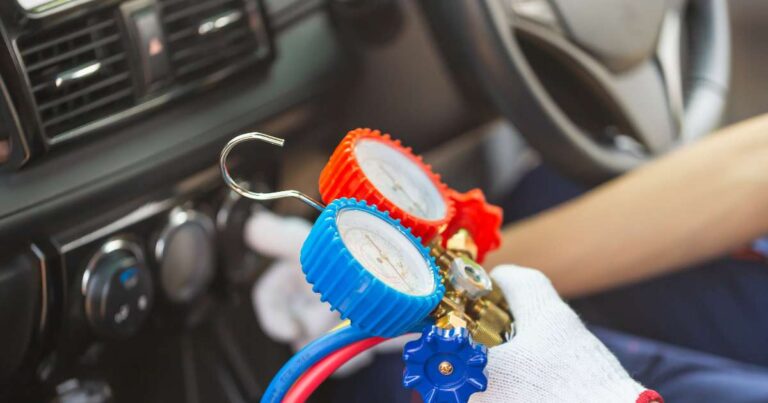Hot summer days call for a trusty sidekick – your car’s air conditioner. It’s like a cool oasis on wheels, right? But what do you do when it decides to play hard to get? We’ve all been there. Whether you’re a grease monkey at heart or prefer to let the pros handle it, this here guide’s got your back. It’s gonna break down the common hiccups your car’s AC can throw at you, spill the beans on what jacks up the repair costs, and give you the lowdown on the green stuff. So, grab a seat and a cold one – we’re diving into car AC know-how.
First things first, let’s get the basics down. Your car’s AC system ain’t just a bunch of cold air fairies. It’s got its own crew of key players, including:
- The Compressor: This baby’s the heart of the show. It squeezes that refrigerant gas and dishes out the cool breeze.
- The Condenser: It’s like the radiator’s cool cousin. This gizmo takes the heat out of the refrigerant, turning it into high-pressure liquid goodness.
- The Evaporator: Usually hiding inside your ride’s cabin, this one’s in charge of chillin’ the air. It blows that coolness through your vents.
- Refrigerant: This stuff does the loop-de-loop, going from gas to liquid and back again. That’s how it keeps things frosty.
- Expansion Valve: Think of it as the traffic cop for the refrigerant, making sure it cools down in a hurry.
Now, on to the dirty laundry. Here are the usual suspects when your car’s AC is acting all shady:
- Refrigerant Leaks: When the AC ain’t icy, it’s often ’cause this bad boy’s got leaks. They can pop up in hoses, the compressor, or the condenser. Finding and fixing these leaks is key to getting your cool back.
- Electrical Shenanigans: Dodgy wires, misbehaving blower motors, or cranky switches can all lead to a subpar AC show. These baddies usually need a pro to work their magic.
- Clogged or Grimy Condenser: A mucky condenser can mess with the airflow and leave you with a lukewarm situation. Keep it clean to keep it cool.
- Compressor Capers: If the heart, the compressor, throws a fit, get ready for a wallet workout. Weird noises and lukewarm breezes are signs that it’s time for a replacement.
- Evaporator Episodes: When these coils freeze or get blocked, you’ll be sweating buckets. Regular TLC can stop this drama.
Now, let’s talk dough. There’s a bunch of factors that can tug at your purse strings when it’s AC fixing time:
- Repair Type: Simple fixes, like a refrigerant refill, are pocket-friendly. But when you’re talking about major stuff like a new compressor or condenser, be ready to shell out.
- Labor Loot: Where you’re at and who’s turning the wrenches can impact the labor costs. Some places charge more for the same gig, so it pays to shop around.
- Part Price Tag: The parts you need depend on your ride’s make and model. Fancy cars might mean fancy price tags for their parts.
- Extra Repairs: Sometimes, you find more problems while fixing the first one. Fix ’em all to keep your AC in top shape, but don’t be shocked if your bill goes up.
- DIY vs. The Pros: To fix or not to fix, that is the question. Doing it yourself can save some dough on labor, but you gotta know your stuff and have the right tools.
Now, let’s hit you with the cash facts:
- A refrigerant recharge – that’s the budget option – will set you back between 50 and 150 bucks.
- Compressor on the fritz? You might be saying goodbye to 500 to 2,500 bucks. Ouch!
- Condenser conundrum? Prepare to drop 400 to 1,300 dollars.
- Electrical snafus are kinder to your wallet – expect to fork out between 100 and 500 bucks.
- If the evaporator’s causing a ruckus, you’re looking at a bill in the range of 200 to 1,000 dollars.
To wrap it up, being in the know about AC troubles and what makes those repairs costly is a must for any car owner. Keep your cool with regular TLC and don’t ignore the bumps in the road. When it’s time to fix things, consider the type of repair, who’s doing the fixing, and what parts you need. Being in the driver’s seat of your AC fixes will keep you cruising in comfort.
FAQs
Q1: How do I know if my car’s AC system is malfunctioning?
A1: Look out for signs like reduced cooling, strange noises, or warm air blowing from the vents. These are common indicators that your AC system might be acting up.
Q2: Can I fix minor car AC issues myself to save money?
A2: You can, but it depends on your expertise and access to the right tools. Minor problems like a refrigerant recharge can be DIY-friendly, but major issues are best left to the pros.
Q3: What factors affect the cost of car AC repairs?
A3: Several factors come into play, including the type of repair needed, labor costs in your location, the price of replacement parts, the discovery of additional issues during the repair process, and whether you opt for professional help or go the DIY route.
Q4: What’s the average cost of a refrigerant recharge for a car’s AC system?
A4: A refrigerant recharge is a more budget-friendly option, typically ranging from $50 to $150.
Q5: How much does it cost to replace a car’s AC compressor?
A5: Replacing the AC compressor is a more substantial repair and can set you back anywhere from $500 to $2,500, depending on your vehicle.
Q6: Is it important to address all identified issues during AC repairs?
A6: Yes, it’s crucial to fix all problems to ensure your AC system functions optimally. Ignoring additional issues may lead to further problems down the road.
Q7: Can I save money on labor costs for AC repairs by shopping around for different mechanics?
A7: Yes, labor costs can vary between repair shops, so it’s a good idea to get quotes from different mechanics to find the best price for the service you need.
Q8: Are high-end or luxury cars more expensive to repair in terms of AC components?
A8: Yes, replacement parts for high-end or luxury cars can be pricier, affecting the overall cost of AC repairs.
Q9: What’s the price range for fixing electrical issues in a car’s AC system?
A9: Electrical problems are often more affordable to fix, with a price range of approximately $100 to $500, depending on the extent of the issue.
Q10: How can I ensure my car’s AC system stays in top condition?
A10: Regular maintenance, including cleaning the condenser and addressing issues promptly, is essential for keeping your AC system running smoothly and ensuring your comfort during drives.


